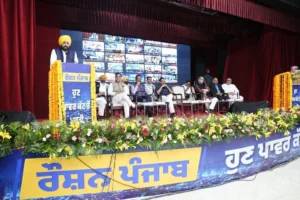Jalandhar, October 11 — The Punjab Government has rolled out the ₹5,000-crore Roshan Punjab Mission, an ambitious initiative to provide uninterrupted electricity to homes, farms, and industries across the state with Chief Minister Bhagwant Singh Mann and Aam Aadmi Party’s National Convener Arvind Kejriwal jointly laying the foundation stone for what officials described as Punjab’s largest-ever power infrastructure project.
“This mission guarantees that no farmer will be left waiting for electricity, no student will lose study hours, and no industry will stop production due to power shortage,” Mann said while addressing a large gathering that included thousands of residents, ministers, legislators, and Punjab State Power Corporation Limited (PSPCL) officials. He called the project “a long-cherished dream of the people now turning into reality.”

The mission seeks to overhaul Punjab’s outdated power transmission and distribution systems that have caused recurrent outages and voltage drops over the years. Under the project, substations will be upgraded, high-capacity lines will be laid, and old cables will be replaced to create a more resilient grid network in both urban and rural areas.
Officials noted that the modernized network will curb technical losses, reduce interruptions, and make electricity delivery more efficient. The government plans to introduce smart meters, automated fault detection, and remote monitoring systems in 13 key cities — including Amritsar, Ludhiana, Jalandhar, Patiala, Mohali, Bathinda, and Ferozepur.
Public safety will also be a key focus. The government will replace unsafe open meter boxes, remove dangling overhead wires, and revamp the 1912 power helpline into a fully digital grievance redressal system to enable real-time complaint resolution. PSPCL will oversee the adoption of global safety standards for new transmission poles and cables designed to withstand extreme weather conditions.
The initiative also includes installing weather-resistant, tamper-proof meters to ensure accurate billing and enhance transparency. Mann said the mission aligns with his government’s broader goal of transforming Punjab from an agriculture-dependent to a technology-driven state economy. He mentioned that the state has secured long-term coal supply agreements with Coal India and other suppliers to ensure affordable and consistent power generation.
According to senior officials, the Roshan Punjab Mission will help reduce energy costs for farmers, provide subsidized rates to small-scale industries, and attract domestic and foreign investments, thereby creating large-scale employment for young people.
“This isn’t just a power sector reform — it’s a social and economic shift,” said a top government official. “Reliable electricity drives industrial growth, empowers rural economies, and ultimately lifts the entire state.”
The government said the project was designed through consultations with local bodies, industry groups, and Panchayats to ensure it meets the state’s ground realities. It will also bring in consumer-friendly services such as mobile app-based complaint systems, single-window power connections, and online billing to make the electricity sector more accountable and transparent.
Officials added that Punjab’s model could serve as a template for other states planning to modernize their power infrastructure. The Mann government believes the Roshan Punjab Mission will illuminate the state’s path toward energy security — ensuring every home is lit, every field powered, and every industry running without interruption.


